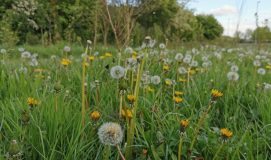Newark and Sherwood District Council is again joining the No Mow May initiative and letting the grass grow in certain areas of local green spaces and country parks.
First launched in 2019 by the botanical charity Plantlife, the No Mow May campaign asks people to let nature flourish and lock up their lawnmowers for the month of May. The aim of the campaign is to let the grass grow and wild flowers bloom, in doing so a ‘nectar feast’ is provided for pollinators such as honeybees, bumblebees, butterflies and moths, and beetles.
During May the council’s Grounds Maintenance team will be cutting back on the mowing of certain areas around the district and focusing on other environmental activities. Various council-owned green spaces and country parks will be left to grow as part of campaign.
The areas will include sections of:
- Barnby Road Play Area
- Bishops Drive Cemetery
- Blidworth Church Cemetery
- Clay Lane
- Library Garden
- Newbury Road
- Ossington Church Yard
- Polkington Crescent Winthorpe Village
- Sconce and Devon Park
- Thorpe Oaks
Full meadow areas will be left at:
- Boughton Open Space
- Sherwood Heath
- Vicar Water Country Park
These areas have been chosen in order to ensure there are still areas being mown that will still allow residents to continue activities such as dog walking, and allow children to play in more maintained green spaces.
Coun David Lloyd, council leader said: “I encourage our residents to join us in No Mow May. Leave your lawnmower in the shed for the month and let’s do our bit for nature.
“I hope that taking part in the No Mow May campaign will allow our communities green spaces and country parks to bloom with wildflowers and allow wildlife such as pollinating insects like bees and butterflies to thrive.”
“We’re always working to make Newark and Sherwood a cleaner, safer, greener place to enjoy and this is just one initiative we are bringing in to do just that. Join in the campaign, make a beeline for our beautiful parks and green spaces to come and see what we’re doing and let’s hope it makes a positive change.”
Research from the campaign has previously shown that mowing your lawn less frequently can provide enough pollen and nectar for ten times the amount of bees, butterflies and other pollinators and insects. The research also showed more than 200 species of plants, including rare meadow flowers, were found flowering within the grasses that were left to flourish.



 Posted on 9th May
Posted on 9th May


